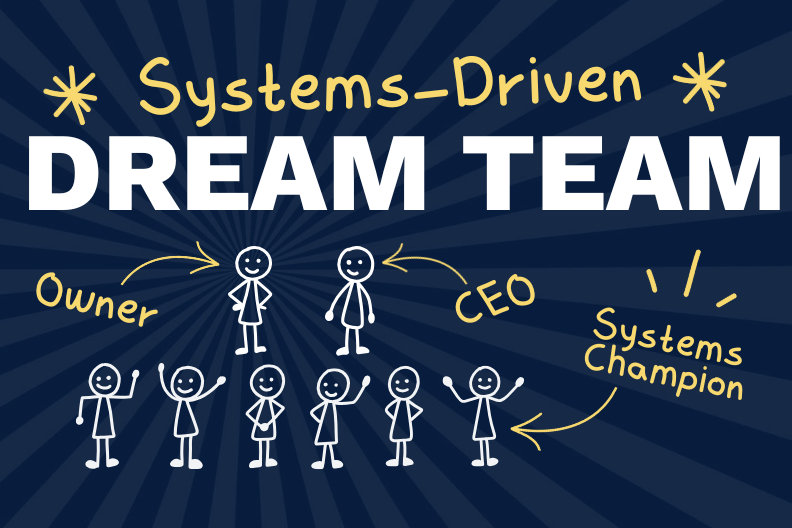Systems don’t build themselves.
They need the right people: people who understand their role, respect the process, and work together without stepping on each other’s toes.
But here’s where most businesses trip up… They think building a systems team means filling a bunch of roles on an org chart and calling it done.
It doesn’t work that way.
You need the right structure. You need clarity. And you need people who actually collaborate instead of just showing up.
In this post, you’ll get a blueprint for assembling a systems team that works: one that turns chaos into consistency and frees you from being the only person who knows how anything gets done.
Why Your Systems Team Matters
Long-term business success comes down to systems.
Not software.
Not motivation.
Systems.
And systems are only as good as the people building and running them.
That’s where your systems team comes in.

Without them, you’re stuck answering the same questions over and over. You’re training every new hire from scratch. You’re the bottleneck.
With them, you build a business that runs without you constantly holding it together.
“Systems are only as good as the people building and running them.”
So who needs to be on this team? Eight key roles.
The 8 Key Roles
Here’s the lineup:
- Business Owner – The visionary who believes in systems
- CEO – The driver who makes it happen
- Operations Manager (or COO) – The overseer of daily execution
- Department Heads – The specialists who run their areas
- Knowledgeable Workers – The experts with critical task knowledge
- Systems Champion – The culture builder who keeps systems alive
- Documenter – The translator who turns process into procedure
- SYSTEMologist – The accelerator who speeds everything up
Now let’s break down what each of these people actually does.
How Each Role Functions in Your Systems Team
Business Owner – The Visionary
Here’s the irony: the Business Owner is the first person responsible for building systems that let the business run without them.
Sounds backward, doesn’t it?
But that’s the goal. A business that works without its owner is the ultimate asset. A well-oiled machine you can step away from and it keeps running.
What the Business Owner should do:
Focus on the big picture. Think about what the business could be and how systems make that possible.
The Business Owner sets the tone. When leadership values systems, allocates resources to build them, and treats them as non-negotiable, everyone else follows.
“As a business owner, you need to understand that every team member plays a part in building the well-oiled machine you want.”
What the Business Owner should NOT do:
Document the systems themselves.
You’re not the best person for that job. Your role is to communicate the vision to the CEO or Operations Manager and let them execute it.
CEO – The Driver
If the Business Owner believes in systems, the CEO drives them.
The CEO takes the vision and turns it into reality. They manage the systems team, hold people accountable, and create the space for system development to happen.
What the CEO should do:
Run the initiative. Keep the team moving forward. Make sure system building doesn’t get pushed aside for “urgent” tasks that could’ve been prevented with better systems in the first place.
In many small businesses, the Business Owner also plays CEO. If that’s you, one of your first goals should be splitting these responsibilities.
Why? Because the ultimate goal is a business that doesn’t need you in the weeds. Step away from operations early, and you get there faster.
Operations Manager – The Overseer
The Operations Manager (sometimes called the COO) handles the grind.
They make sure the team follows the systems. They keep standards high. They watch for breakdowns and fix them before they become bigger problems.
What the Operations Manager should do:
Oversee the daily operations and make sure your systems aren’t just sitting in a folder somewhere gathering dust.
But here’s the thing: the Ops Manager can’t micromanage every detail. That’s impossible.
That’s where Department Heads come in.
Department Heads – The Specialists
Department Heads own their area of the business.
They’re responsible for the success of their team, the quality of their output, and the systems that make it all work.
What the Department Heads should do:
Make sure their team follows the systems. Work with the Systems Champion to document current processes. Identify repetitive tasks that can be delegated to less skilled team members.
Each department should have at least three to five core systems documented. That way, when a new team member joins, they can hit the ground running instead of wandering around asking questions.
These systems get executed by Knowledgeable Workers.
Knowledgeable Workers – The Experts
Knowledgeable Workers are the people who’ve been doing the work. They know the tasks inside and out, usually the recurring ones that keep the business moving.
Their expertise is valuable. Too valuable to stay locked in their heads.
What the Knowledgeable Workers should do:
Work with the Department Head and Systems Champion to extract, organize, and document their knowledge.
Here’s the problem: these people are usually busy. Really busy.
So make it easy. Record their screen while they work and explain what they’re doing (Loom works great for this). Or hop on a Zoom call and have them walk through the process while you record it.
Once you turn their knowledge into a documented system, newer or less skilled team members can learn the task. The Knowledgeable Worker moves on to more complex work. Everyone wins.
Systems Champion – The Culture Builder
Here’s what happens in most businesses: systems get built, then forgotten.
Everyone goes back to doing things their own way. The manual collects dust. Nothing sticks.
That’s why you need a Systems Champion.
What the Systems Champion should do:
Keep systems alive. They’re the driving force behind continued development and improvement. They have a sharp eye for processes that need documenting and people who can help.
They also make critical decisions like:
- How detailed should this system be?
- Is this task going to be passed down to less skilled team members? (If yes, add more detail.)
- Does this process need updating, or is it fine as-is?
You want someone curious, organized, and detail-oriented. Ideally, they’re trained in SYSTEMology. They understand your business, your software stack, and how everything connects.

And here’s where it gets interesting: as AI becomes more embedded in business operations, your Systems Champion naturally evolves into a Systems and AI Champion. They’re the ones spotting where AI can speed up documentation, where automation makes sense, and where human judgment still matters. Their deep understanding of your processes makes them perfectly positioned to identify AI opportunities that actually add value.
If you don’t have a Systems Champion yet, here’s how to find the right one.
Documenter – The Translator
Systemization means documentation. Lots of it.
The Documenter takes recorded processes and turns them into written, usable procedures.
What the Documenter should do:
Watch the videos from Knowledgeable Workers and create the first draft of the system. Then they hand it to the Systems Champion for review before it goes to the team.
In smaller businesses, the Documenter and Systems Champion are often the same person. As you grow and build a systems-driven culture, you might split these roles.
SYSTEMologist – The Accelerator
A SYSTEMologist is a licensed systems consultant who speeds up the entire process.
When your systems are a mess and you need help fast, this is the person you call.
What the SYSTEMologist should do:
Think of them as a systems coach who actually does the work:
- Handles the first wave of documentation
- Creates the gold standard for all future systems
- Trains your Systems Champion
Depending on where you are in your systems development, a SYSTEMologist can give you different levels of support. They help you build momentum fast, especially if you’re starting from scratch or stuck in bad habits.

Does Everyone Else Matter?
Yes.
Everyone mentioned above has a critical role. But here’s the reality: your entire team needs to be involved in systemizing the business.
Systems aren’t just for leadership. They’re for everyone.
As a business owner, you need to understand that every team member plays a part in building the well-oiled machine you want.
A systems culture doesn’t work if only the top cares. It works when everyone buys in.
“Systems aren’t just for leadership. They’re for everyone.”
How AI Fits Into Your Systems Team
Here’s something most businesses miss: AI doesn’t replace your systems team.
It makes them better.

Think of AI as giving each team member a super-powered assistant.
Your Documenter can now turn video recordings into documented procedures in minutes instead of hours. Your Systems Champion can spot optimization opportunities faster by analyzing patterns across multiple processes. Your Knowledgeable Workers can focus on the complex, nuanced work while AI handles the routine parts.
But here’s the real opportunity.
Every system you document becomes training material for AI. That means your Systems Champion isn’t just creating instructions for humans anymore: they’re building the knowledge base that powers your AI tools.
Want an AI assistant that understands your customer service process? Feed it your documented SOPs. Need help onboarding new team members faster? Your systems documentation trains the AI to answer their questions accurately.
“AI doesn’t replace your systems team. It makes them better.”
The companies that will lead their industries over the next decade aren’t the ones using AI for the sake of using AI. They’re the ones combining documented systems with AI capabilities. Systems provide the structure. AI provides the speed.
That’s why your systems team matters even more now than before. They’re not just building a business that runs without you: they’re building one that’s ready for the future.
Making Teamwork Actually Work
Getting different people, from the Business Owner down to entry-level team members, to work together isn’t automatic.
Here’s how you make it happen:
Define Roles Clearly
Everyone needs to know what they’re responsible for.
Document it. Make it clear. No guessing.
When people understand their role, there’s no confusion, no tension, and no power struggles. Nobody’s left wondering who’s supposed to handle what.
Set Shared Goals
Your team needs to know what they’re working toward: both short-term and long-term.
Clear, achievable goals give the team direction. They create a way to measure progress. And they make people feel secure because they know where the business is headed.
Match Skills to Tasks
Put people in positions where they can use their best skills.
This isn’t some feel-good exercise. It’s practical. When people do work they’re good at and enjoy, they perform better. The company wins. The team wins.
Figure out how each person’s talents fit into your system. Then let them run with it.
The Bottom Line
Building a systems team isn’t about filling an org chart.
It’s about getting the right people in the right roles, making sure they understand what they’re doing, and creating a culture where systems actually get built and followed.

When you nail this, you’re on your way to a systemized business: one that runs without you constantly putting out fires.
And that’s the whole point.
If you need help building your systems team or creating a systems-focused culture, contact us. We’ll help you get it done.








